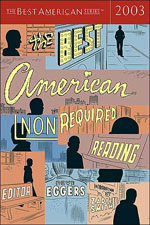[Transcribed discussion of “Nowtrends,” by Karl Taro Greenfeld, published in American Short Fiction.
In this story a journalist goes to Chengdu, China to interview a young pop star named Xiu Xi. He carries with him money that he may need to bribe the pop star’s manager. “We are at the stage in our great socialist experiment when we are no longer sure who should pay whom,” he says. En route to the interview, however, he learns that an old friend has been arrested for subversive political activity. The journalist uses the bribe money to pay off one of his friend’s guards. The guard then allows the journalist to visit his friend in jail. The rest of the story follows two interwoven tracks, one public and the other private. These are, first, the journalist’s strange interview with a dolled up pop star and, second, his secret efforts to save his friend.]
Sophia: The writing is really good. I kept forgetting it was fiction. Is this writer a journalist in real life?
Joseph: He is. I looked it up. Apparently he’s a well-respected journalist who writes about Asia and especially China. This stuff is real for him.
Bora: For a while I wasn’t sure if it was non-fiction or fiction, either. I liked that. I liked that you could forget whether you were reading journalism or a story. To me that’s a sign of good writing. He made things so real I forgot the story was made up.
Yael: And it was interesting. The part about having to bribe Xiu Xi to get an interview with her was funny to me. It’s a whole different system there.
Sophia: The writer does a really good job of giving us a factual portrait of modern China. It’s written like good journalism: short sentences, statements of fact, not too much speculation.
[Near the end of the story, the journalist’s friend is convicted of associating with a radical political organization and sentenced to death. His organs are to be harvested by the Chinese government.]
Will: Do they really do that? Harvest organs of people they execute? That seemed a little far-fetched to me.
Eli: I’ve read about that elsewhere. It really happens. It is hard to believe, though.
Will: It didn’t seem possible to me. It made me doubt the rest of the story. But if you’ve heard of that happening…Wow. That’s pretty scary.
Eli: Yeah I don’t think he made that up. That happens. I thought overall it was a really well written story, and I thought the writer did his homework. He did good research. He made everything plausible.
Subscribe to:
Post Comments (Atom)









No comments:
Post a Comment